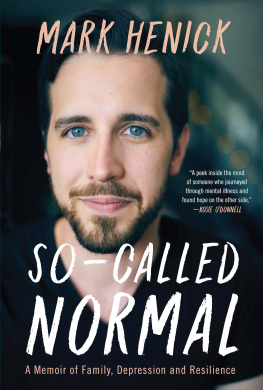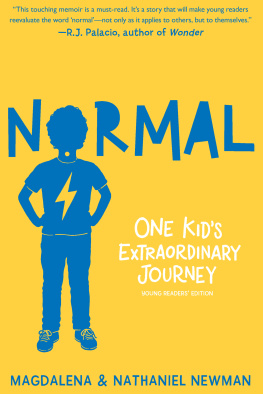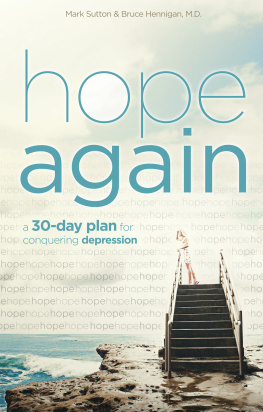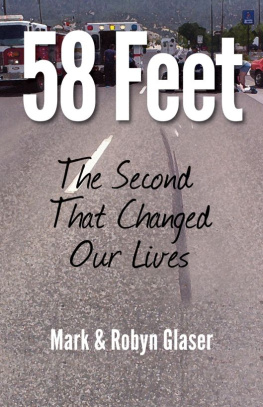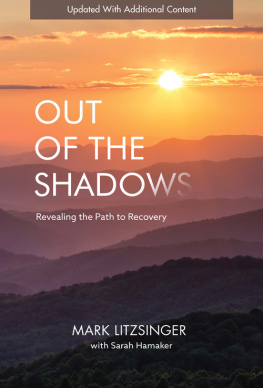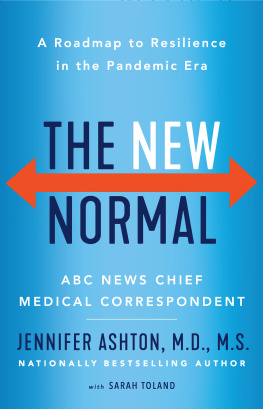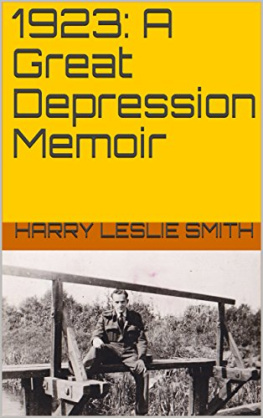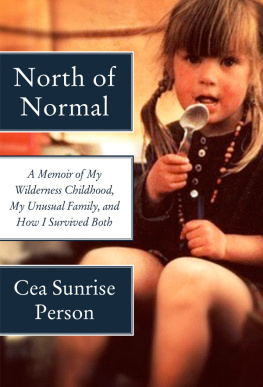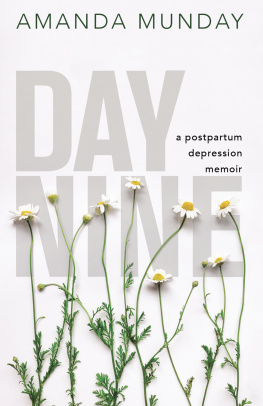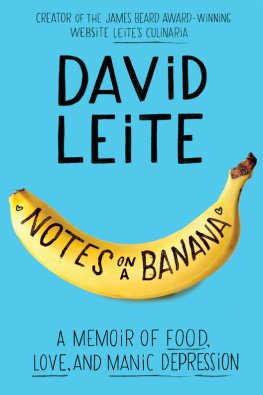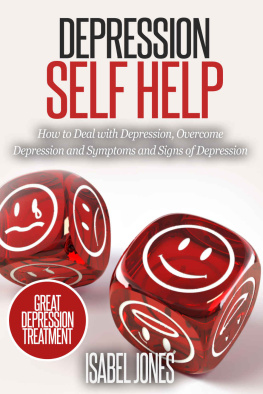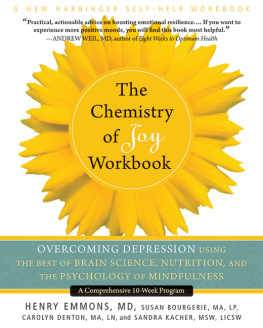Mark Henick - So-Called Normal: A Memoir of Family, Depression and Resilience
Here you can read online Mark Henick - So-Called Normal: A Memoir of Family, Depression and Resilience full text of the book (entire story) in english for free. Download pdf and epub, get meaning, cover and reviews about this ebook. year: 2020, publisher: HarperCollins Publishers, genre: Detective and thriller. Description of the work, (preface) as well as reviews are available. Best literature library LitArk.com created for fans of good reading and offers a wide selection of genres:
Romance novel
Science fiction
Adventure
Detective
Science
History
Home and family
Prose
Art
Politics
Computer
Non-fiction
Religion
Business
Children
Humor
Choose a favorite category and find really read worthwhile books. Enjoy immersion in the world of imagination, feel the emotions of the characters or learn something new for yourself, make an fascinating discovery.
- Book:So-Called Normal: A Memoir of Family, Depression and Resilience
- Author:
- Publisher:HarperCollins Publishers
- Genre:
- Year:2020
- Rating:5 / 5
- Favourites:Add to favourites
- Your mark:
- 100
- 1
- 2
- 3
- 4
- 5
So-Called Normal: A Memoir of Family, Depression and Resilience: summary, description and annotation
We offer to read an annotation, description, summary or preface (depends on what the author of the book "So-Called Normal: A Memoir of Family, Depression and Resilience" wrote himself). If you haven't found the necessary information about the book — write in the comments, we will try to find it.
Mark Henick: author's other books
Who wrote So-Called Normal: A Memoir of Family, Depression and Resilience? Find out the surname, the name of the author of the book and a list of all author's works by series.
So-Called Normal: A Memoir of Family, Depression and Resilience — read online for free the complete book (whole text) full work
Below is the text of the book, divided by pages. System saving the place of the last page read, allows you to conveniently read the book "So-Called Normal: A Memoir of Family, Depression and Resilience" online for free, without having to search again every time where you left off. Put a bookmark, and you can go to the page where you finished reading at any time.
Font size:
Interval:
Bookmark:
This is for you, Mom.
Now Ill let you rest,
so that I may sleep.
If you are silent about your pain, theyll kill you and say you enjoyed it.
Z ORA N EALE H URSTON
T HIS IS THE END .
Im sure of it. At least, I think Im sure. I dont want to die. Its just that dying is sort of a non-negotiable part of killing yourself. I have no choice. It feels like nobody can help me, however much they tried, or tried to try. I tried too, for a while. I cant anymore. I cant live like this.
Its nearly midnight. My socks are in my pocket. My feet are cold and naked in my shoes. My heels balance on the chipped concrete edge, while my toes hang out over nothing. I shift my footing and a team of tiny pebbles spills from the side of the bridge. I look down. I watch the pebbles fall as far as I can see them, from my hand-me-down runners to the scraggy ground below. Its probably far enough to do the job, if I can stick the landing as I have visualized so many times. It might be twenty feet down, maybe fifty. I dont know, Im not good at measurements. Im not good at a lot of things.
My arms are stretched out along the dull-grey railing thats pressing against my back. My arms are resting on it, not clinging, casually crucified. The four tubular rungs of the railing run horizontally behind me, like a fence thats keeping me outside the land of those who live happily ever after. I dont belong in that place and I never will. The top two rungs curve a little, shifting my centre of gravity. Im leaning back from the drop, toward the mostly empty road on the bridge that I half crossed to get here. The inward curve was probably meant to stop people from climbing the railing to begin with. I scaled the rungs easily enough, straddled the top, swung my legs over and climbed back down the other side. This isnt my first time here.
Im calm and tense. My muscles are soft, but my thoughts are tight. Ive learned the hard way not to let my body betray my minds secrets. My fingers are cold and numb, holding me lightly. The railing is wet. Its been a misty Sunday, mid-March, not uncommon on this island. Im cornered by dirty melting snow all around me, the last of a stubborn winter, splashed into the gutters beside the narrow sidewalk that stretches along the side of the bridge. I think about how much I miss the summer.
This place has been part of the plan for the last few months. The bridge is part of an overpass that connects the two neighbourhoods on either side of the sprawling, shuttered steel plant. There are two worlds beyond my fingertips, to either side of my outstretched arms. In one direction, beyond my right hand, is Whitney Pier. Thats where I tried to live, most of the time. Beyond my left hand is the rest of Sydney. I have never been anywhere else and dont know many others who have. Not many people make it out of this place alive. The only way out of the Pier, at least for a kid escaping on foot, is the overpass. At this moment, it certainly feels like the only way out for me.
I study the ground below. Theres a long chain-link fence topped with mangled lines of barbed wire. The fence is coated with layers and years of grey paint, but the rust bleeds through anyway. How far out will I need to jump, I wonder, with my peculiar calm rigidity, so I dont land on the fence? The whole point is to end the pain, not add to it. A century of steelmaking has left the ground useless, worn out and toxic. Its dirty and dead down there now, I think. This place understands me. It looks as I feel.
I let my gaze follow the line of the rusty fence. It cuts through the backyards of a row of duplex company houses that border the plant. The second one is my Nana Ags. It looks small and insignificant from up here. I probably look small and insignificant from down there. Everything feels small, the whole city, yet still I feel smaller. Sydney stands quiet, closed, on the better side of the train tracks that run under the bridge, through Nana Ags backyard, to the harbour cranes on the horizon in front of me.
Even the bridge itself doesnt really have much purpose these days. The plant has closed and left its waste behind. Theyll tear it all down someday, or it will crumble to the ground. The crumbling has been under way for years. For the bridgeand me. Thats how things go here. Fall, or be felled.
Now Im stuck. I cant go back. I wont give them the pleasure. I have to tear it all down. A car passes on the road behind me. It sounds distant and foreign. The driver doesnt see me. Nobody sees me under the incandescent yellow glow of the light post to my left. I used it to steady myself when I climbed over the railing. I didnt want to slip and fall; that wasnt part of the plan. This isnt supposed to be an accident. This is my choice because, as far as I can see, I have no other choices.
I hear another car pass, the sound of tires on wet asphalt, the familiar double thump, the distinctive sound of wheels passing over the exposed steel section connectors that barely hold the old overpass together. A hollow, rhythmic soundthump, thump. For a fleeting moment it breaks the silence around me, it punctures the noise inside me, then its gone. The noise inside me returns to fill the void, like little underwater explosions.
Thump, thump.
I notice each car that doesnt see me. Its amazing, all we see yet fail to notice.
Thump, thump.
Sure, some people tried to help. Doctors, nurses, parents, priests. Some were nice, some not, most either in the middle or indifferent. Id become just another hopeless case, a frequent flyer, a lost soul. Abandon hope, all who enter here.
I notice someone over my shoulder. I didnt hear him arrive. Hes been talking to me, trying to help. Too bad Im helpless. The cops are here now too. Beyond my fingertips, in both directions.
I pull my gaze from the unreachable horizon long enough to see that theyve barricaded the bridge, that crowds have started to gather. I know theyve come to see me fall. I feel nothing. Theres nothing to see here. Im surrounded by people, yet still Im alone.
Theres laughter, somewhere. Its all I can hear, even in the silence, laughter, stabbing me in the head.
Fall, or be felled. Fuck it. Ill tear it all down.
I feel my heart in my chest.
Thump, thump.
My mind is noisy again. Theres a lot happening behind me now.
I tried, I cry aloud. I tried, I tried, I tried.
Thump, thump.
I cant. I have no choice.
Jump, you coward! someone shouts.
Thump, thump.
I let go.
Tell me, what else should I have done?
Doesnt everything die at last, and too soon?
Tell me, what is it you plan to do
with your one wild and precious life?
M ARY O LIVER , T HE S UMMER D AY
I COULD SEE MY GRANDMOTHER S HOUSE FROM WHERE I stood, on the wrong side of the railing.
I cant remember the names of all Nana Ags kids. Then again, neither could she. There were seventeen in total, including my mom. Most of those kids had kids of their own, and many of those eventually had kids too. By the time I came along, Nana didnt get too caught up in names. She would rattle off three or four guesses before saying, Hey you! Shed point if she meant you. Who owns you? shed ask. Knowing who our parents were at least narrowed the field. It still makes me smile to remember her forgetting our names, long before she forgot us all for good.
The Costigans were a devout Catholic family, Irish via Newfoundland, so that should explain the large family. Nana Ag raised the first half of them, including Papa Mikes five kids from his first wife, in a ramshackle attic apartment above an old movie theatre in the Pier. After the skylight collapsed, raining shards of glass onto one of my uncles in his crib, they decided it was time to find new lodgings. They moved to a little three-bedroom duplex on Railroad Street just before my mom was born. It was a closer walk for Papa to get to work at the plant. Hed bought both sides of the duplex sight unseen but moved his family into only one. He rented out the other side to pay for it. A lot of my memories started on Railroad Street.
Font size:
Interval:
Bookmark:
Similar books «So-Called Normal: A Memoir of Family, Depression and Resilience»
Look at similar books to So-Called Normal: A Memoir of Family, Depression and Resilience. We have selected literature similar in name and meaning in the hope of providing readers with more options to find new, interesting, not yet read works.
Discussion, reviews of the book So-Called Normal: A Memoir of Family, Depression and Resilience and just readers' own opinions. Leave your comments, write what you think about the work, its meaning or the main characters. Specify what exactly you liked and what you didn't like, and why you think so.

